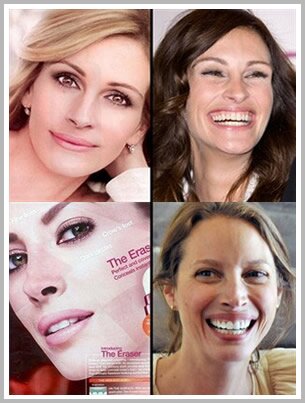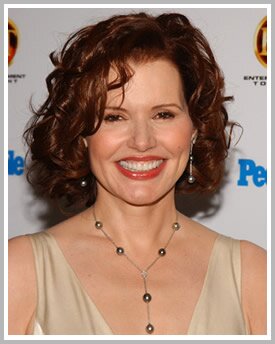Airbrushed Make-Up Ads Featuring Julia Roberts are Banned in Britain
 Most people are so used to airbrushed advertisements that they don’t even give them a second thought. But Britain has decided to take a stand against such ads – last week the country’s Advertising Standards Agency banned Maybelline and Lancome ads featuring Julia Roberts and Christy Turlington.
Most people are so used to airbrushed advertisements that they don’t even give them a second thought. But Britain has decided to take a stand against such ads – last week the country’s Advertising Standards Agency banned Maybelline and Lancome ads featuring Julia Roberts and Christy Turlington.
The ASA found that the magazine ads (see pics at left) were misleading, and exaggerated the ability of the products they were promoting to cover lines, wrinkles and blemishes. “On the basis of the evidence we had received we could not conclude that the ad image accurately illustrated what effect the product could achieve, and that the image had not been exaggerated by digital post production techniques,” the ASA said.
Even though L’Oreal admitted the photographs it used had been digitally manipulated and retouched, they claim the pics “accurately illustrated” the effects their make-up — Maybelline‘s The Eraser anti-ageing foundation and Lancôme‘s Teint Miracle –could achieve. They described the picture of Julia Roberts as an “aspirational picture.”
The ban was sparked by Jo Swinson, an activist who campaigns against the use of unrealistic images in fashion and advertising.
Kudos to the ASA for sending such a strong message to advertisers and marketers. Such extensive airbrushing on ads is not only essentially selling a lie – there is no product on earth (other than Photoshop software) that can achieve the kind of flawless skin shown in these ads – but it’s also selling girls and women short, by reminding them that they’re not beautiful just the way they are. These “aspirational pictures” send the message that we should “aspire” to look like these beautiful women, even though the look they’re selling isn’t actual real. Where’s the beauty in that?
What do you think about the practice of airbrushing images?


 Remember this past January when I ran
Remember this past January when I ran  You all know that I’m a big believer in the power of sports and exercise in the life of girls and women. Beyond all the research that shows that participating in sports can improve grades, boost moods, improve self-esteem, and basically help one be more successful, there’s also the fact that I just happen to think sports and exercise is good for the soul.
You all know that I’m a big believer in the power of sports and exercise in the life of girls and women. Beyond all the research that shows that participating in sports can improve grades, boost moods, improve self-esteem, and basically help one be more successful, there’s also the fact that I just happen to think sports and exercise is good for the soul.
